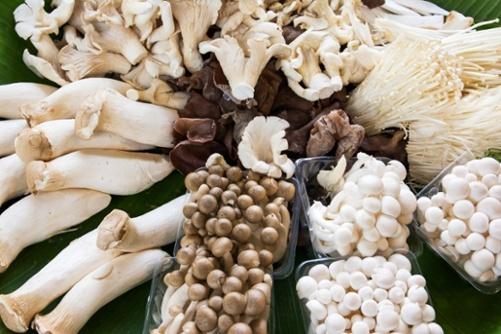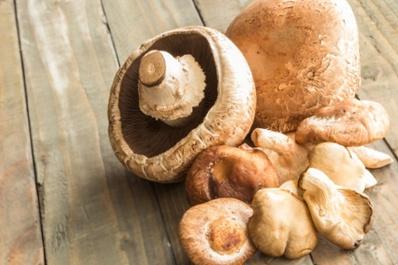
SO, WHAT ARE MEDICINAL MUSHROOMS?
THE PROBLEM WITH MEDICINAL MUSHROOMS
It might seem, based on their benefits, that everyone should add medicinal mushrooms as a staple to their diet.
The problem with that logic, however, is that in their natural form are poorly absorbed: their biologically active component (polysaccharides) are too large to slip through the small openings in the stomach and intestine meant to absorb nutrients.
However a group of scientists in Tokyo solved this problem in 1987 with the creation of AHCC, a natural immune-boosting medicinal mushroom compound. These researchers developed a patented fermentation process that substantially reduced the molecular weight (and therefore the size) of the polysaccharides in AHCC.
Normally, polysaccharides have a weight of 200,000 Daltons; the patented fermentation process used to create AHCC reduces their size to a mere 5,000 Daltons, leading to a dramatic increase in absorption and efficacy.
WHAT IS AHCC?
AHCC is obtained from the roots of several subspecies of hybridized medicinal mushrooms.
It is currently also the world’s most researched specialty immune supplement, supported by 20 human clinical studies, over 30 papers published in PubMed-indexed journals and by more than 100 pre-clinical and in vitro studies. It has become Japan’s #1 immune supplement and has become increasingly popular in the United States.
As is typical of mushroom extracts, AHCC offers a significant boost to the immune system and has been shown to offer numerous health benefits, from improving the immune response of healthy people to the influenza vaccine and to stabilizing one man’s chronic lymphocytic leukemia (CLL).
Other ongoing research shows it may also be beneficial in treating or controlling:
- HPV
- Breast Cancer
- Other types of cancer (particularly prostate, liver, lung, colon, pancreatic, stomach, brain, ovarian, etc.)
- The negative side effects of chemotherapy
- Liver ailments.
- Diabetes
- And more (for the full list, click here).
That’s because of how AHCC works. AHCC works by turning up the dial on the body’s natural immune response and has been to shown to increase the number and activity of disease-fighting white blood cells so that the body can easily identify viruses, bacteria, and abnormal cells and fight back more effectively against illness.
POPULAR TYPES OF MUSHROOMS TRADITIONALLY USED FOR MEDICINAL PURPOSES
Button Mushrooms — Button mushrooms contain significant amounts of copper, which helps to create red blood cells. According to sources at LiveStrong, “One cup of cooked button mushrooms supplies the body with 16% of the daily value of iron, important for blood and energy, and 12% of the daily percentage of Vitamin C.”
Chaga Mushrooms — Chaga Mushrooms have demonstrated a wide range of beneficial behaviors including—according to the Memorial Sloan-Kettering Cancer Center— anticancer, antiviral, antiplatelet, anti-inflammatory, analgesic, immune stimulating properties in vitro and hypoglycemic effects in mice.
Cordyceps — Cordyceps is a fungi that has been used for a wide range of conditions. In vitro and animal studies have shown it to have antitumor, radio-protective and anti- diabetic effects; it has also been used to treat fatigue, sexual dysfunction, coughs and as an immune stimulant.
Shiitake — The Shiitake mushroom is cultivated worldwide for its purported health benefits. Lentinan, a polysaccharide isolated from Shiitake, has been shown to have anticancer effects in colon cancer cells. Lentin, the protein component, has strong antifungal properties as well as other positive immune system effects, such as inhibiting the proliferation of leukemic cells.
Maitake — Maitake, the “dancing mushroom,” is used in traditional medicine to treat diabetes and hypertension. Extracts are commonly marketed to enhance immune function and to treat HIV and cancer.
Reishi — Reishi mushrooms have been used for over 4,000 years for a variety of health benefits, including longevity, disease resistance and energy and memory enhancements. Additionally, they have been known to treat cancer, hepatitis, heart disease, arthritis, prevent the death of lymphatic cells, lower blood pressure and increase daily energy levels.

